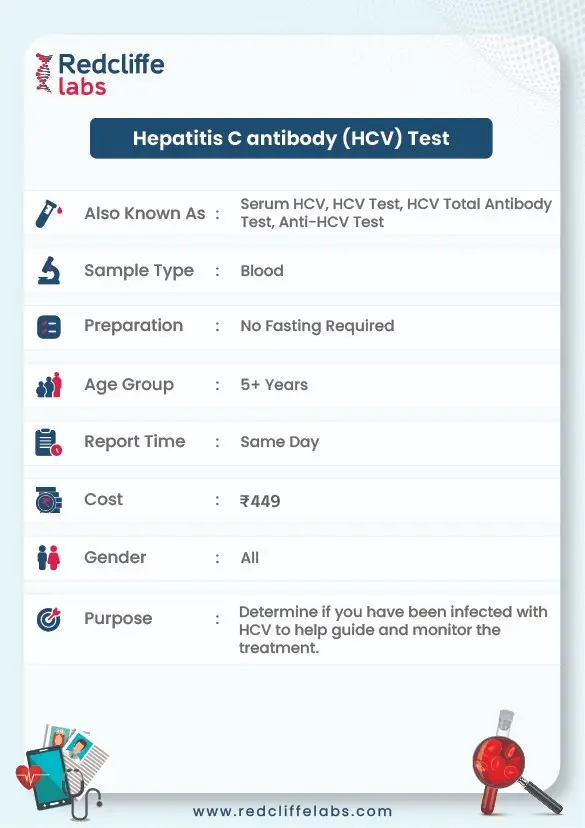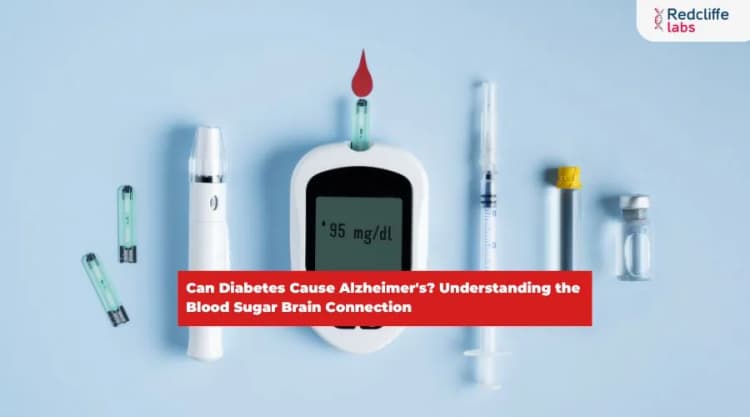This rapid serological test detects antibodies again...Read more
Blood
Unlock special
discount on
this package
Login to Unlock 🔓
Also Known As
HCV Rapid Test, Hepatitis C Rapid Test, Anti-HCV Rapid Test, HCV Antibody Test, Hepatitis C Virus Antibody Test, Rapid Anti-HCV Test, HCV Screening TestNABL Accredited lab*

Booking Benefits Unlocked Worth FREE 799

Report Consultation

Diet Plan
*Available once your report is generated.
At Redcliffe Labs, we have a single goal: to give India its right to quality diagnostics.
Customers served
Tests Processed Everyday
Cities
Collection Centres
World Class In-house Labs
Home Collection Experts
1 Test Parameters
Hepatitis C Antibody (HCV), Rapid Card
1 PARAMETER INCLUDED
1 PARAMETER INCLUDED
- Hepatitis C Antibody (HCV), Rapid Card
Top Booked Health Checkup Packages
Reports in 12 hours
|Parameters 94
Reports in 12 hours
|Parameters 89
Reports in 12 hours
|Parameters 96
Reports in 12 hours
|Parameters 96
Reports in 12 hours
|Parameters 90
Verified by Medical Expert

MEDICALLY REVIEWED BY
Dr. Himani Pandey

WRITTEN BY
Anjali Dubey
Table of Content
Intoduction to Hepatitis C Antibody (HCV) Test
Hepatitis C, often called HCV, is a viral infection primarily targeting the liver, leading to acute and chronic liver diseases. As one of the different types of Hepatitis Viruses, HCV usually transmits via contact with infected blood by sharing needles, receiving a blood transfusion, or using unsterilized medical equipment, and less commonly through sexual intercourse. Doctors suggest an HCV Test to detect the antibodies to diagnose a Hepatitis C infection. The HCV Test doesn’t determine the current status of the infection, nor does it check the extent of the virus in the blood. It can only indicate exposure to the disease at some point. You may need additional tests to assess the extent of the infection and its impact on liver health.
Redcliffe Labs is the best Omnichannel Pan India diagnostic service provider from where you can book a Hepatitis C Test. This looks for antibodies against the virus; their presence in the blood means that a person has been infected at some point. However, it doesn’t always mean they still have it; therefore, additional screenings are suggested to confirm the cause. So, if you have risk factors symptoms or your doctor has recommended an HCV Test, Redcliffe Labs is your all-time go-to-diagnostic partner. We provide diagnostic at the doorstep with express slots that ensure samples get picked up within 45 minutes. In addition, we provide accurate reports on time.
Test Details:
| Also Known As | Serum HCV, HCV Test, HCV Total Antibody Test, Anti-HCV Test |
| Purpose | Determine if you have been infected with HCV to help guide and monitor the treatment. |
| Preparation | Do not drink alcohol or smoke before the test |
| Fasting | No Fasting Required |
| Get Reports Within | Same Day |
| Cost | INR 449 |

Purpose of HCV Test
The HCV (Hepatitis C Virus) Test is used to detect the presence of Hepatitis C virus in the blood. Its primary purposes include:
- Acute hepatitis C—This occurs in the first six months after exposure to the virus. Early-stage illness from acute hepatitis C is often mild and may not cause any symptoms, which is why many people may not realize they are infected. In about 25% of cases, the immune system successfully fights off the HCV infection, clearing the virus from the body.
- Chronic hepatitis C- If your body cannot combat the virus, you may develop chronic hepatitis C. The disease progression from acute to chronic hepatitis C happens in approximately 75% to 85% of patients. The test will help you to diagnose chronic hepatitis C early and prevent complications like liver disease, liver failure, and liver cancer.
- Screen High-Risk People- The test is recommended for people with a history of intravenous drug use, blood transfusions before 1992, or unprotected exposure to infected blood.
- Monitor Treatment Progress—The test evaluates the effectiveness of ongoing hepatitis C treatment by tracking viral load changes over time.
- Preventing Disease Spread- Early detection helps prevent the transmission of the virus to others through timely precautions and lifestyle changes.
- Assessing Liver Health- Since Hepatitis C can lead to liver damage, cirrhosis, or liver cancer, the test helps identify risks early for appropriate intervention.
What does the HCV test detect?
The HCV blood test checks if a person has been infected with the hepatitis C virus. The HCV antibody test, also called the anti-HCV test, detects antibodies to hepatitis C. The HCV test identifies-
- HCV Antibodies indicate whether a person has ever been exposed to the Hepatitis C virus. If the HCV test is positive, the next step is to get tested for hepatitis C RNA, which can indicate if you have a current infection.
- HCV RNA (Viral Load) confirms active infection by detecting the virus's genetic material in the bloodstream. RNA is genetic material from HCV that can be detected in the blood. If the results of an antibody test are positive, the doctor will conduct an RNA test to measure the amount of the virus in the blood. Qualitative tests detect the presence of HCV RNA, while quantitative tests measure the amount of HCV RNA present.
- HCV Genotype—There are six types of hepatitis C, also called strains or genotypes. The
The HCV test helps diagnose Hepatitis C, assess its severity, and guide treatment decisions. If you experience symptoms of hepatitis without any known exposure to HCV, your doctor may recommend an HCV test to detect the risk of HCV.
Who is at high risk of HCV?
The people who are at high risk of HCV infection are-
- People who inject drugs or share a needle with someone who has HCV
- Have been on long-term kidney dialysis
- Have regular contact with blood at work
- Have unprotected intercourse with a person who has HCV
- Were born to a mother who had HCV
- People who have created a tattoo or acupuncture with needles that were being used on another person
- The people who have received an organ transplant from a donor who has HCV
- The people who use share personal items, like toothbrushes and razors, with an infected person
- People who ha
- have received a blood transfusion (since blood screening became available in 1992)
Symptoms That May Call For A Hepatitis C Antibody (HCV) Test:
Often called a silent or asymptomatic disease, Hepatitis C may cause no noticeable symptoms for years. However, some may experience signs that prompt the need for Hepatitis C Testing. Such warning signals that you should pay attention to are:
- Yellowing Of Skin & Eyes: Jaundice is one of the common symptoms linked with Hepatitis C infection that develops when the liver is not functioning properly and is not processing bilirubin properly, leading to yellowish eyes and skin.
- Persistent Fatigue: Unexplained and prolonged tiredness ranges from mild to severe that may interfere with daily activities and could indicate Hepatitis C infection.
- Unusual Abdominal Pain: Some individuals may experience abdominal discomfort or pain around the liver, ranging from dull to acute, depending on their age, gender, and other factors.
- Nausea & Vomiting: Occasional vomiting and nausea are a sign that something is not right with your health, and it could also indicate an acute phase of the infection that needs timely screening.
- Dark Urine Or Pale Colored Stool: The change of urine color to dark and stool color to pale also indicates liver dysfunction, which can be linked with HCV that needs to be diagnosed early for better management.
- Loss Of Appetite: Besides disrupting liver function, it also affects your normal appetite habits, leading to loss of appetite or unintentional weight loss.
- Unexplained Swelling: Swelling in the legs and abdomen is also a sign often linked with liver disease or Hepatitis C infection.
Itchy skin, joint pain, unusual bleeding or easy bruising, and dark circles under the eyes indicate that something is wrong with the liver and may need timely screening. Besides indicating liver problems, the test could also be due to other reasons. Therefore, an accurate diagnosis is essential to confirm the cause and take charge of the condition. Timely diagnosis is essential for better managing the condition and preventing complications to a possible extent. Book HCV Testing with Redcliffe Labs now and take charge of your health today.

Hepatitis C Classified Into:
- Acute Hepatitis C: It is a short-term infection or an initial stage of the disease that mostly causes no symptoms, or sometimes the symptoms are so mild that they often go unnoticed. In most cases, the virus goes away with timely intervention and treatment. However, if left unaddressed, it can lead to chronic infection.
- Chronic Hepatitis C: As a long-lasting or advanced form of Hepatitis C infection, Chronic HCV infection develops when the virus persists in the body for more than six months. It can cause serious complications, like long-term liver damage, cirrhosis, liver cancer, and liver failure, if not addressed appropriately.
In short, taking timely HCV Screening is crucial to diagnose the disease and take appropriate measures while there is still time.
Who should get tested for Hepatitis C?
Since Hepatitis C, in most cases or at the acute stage, causes no symptoms, CDC (Centers for Disease Control and Prevention) suggests HCV Screening for an adult who is 18 or older. The test is also suggested for individuals who might not have noticeable symptoms but are at higher risk.
- Have HIV
- Are pregnant
- Are on kidney dialysis
- Born to mother with HCV
- Have abnormal ALT levels
- Have had a blood transfusion
- Current or past injectable drug use
- Are exposed to HCV-infected needles (especially healthcare providers)
- Individuals with a history of unprotected intercourse with an HCV-positive partner
- Engaged in unprotected intercourse with multiple partners
Apart from that, certain medications or treatments that may need frequent blood transfusion or clotting factor concentrates are at higher risk of developing HCV infection and may need to be tested at the earliest. Book HCV Blood Test at home for accurate and timely diagnosis.
What does the HCV Test result mean?
Before understanding the test results, it is essential to know that the result may vary depending on your age, gender, health history, and other factors, like the type of technique used by the lab. You can clarify your test results with your healthcare provider for better clarification.
The HCV test results are either positive or negative.
- HCV Positive Means: If your HCV Test results are positive, it only indicates the presence of Hepatitis C antibodies in the blood, suggesting exposure to the virus at some point.
- HCV Negative Means: If your HCV Test results are negative, it only indicates no Hepatitis C antibodies were detected, meaning no current or past infection with the virus.
Since the test doesn’t confirm the infection or assess the severity of the disease, doctors often suggest additional tests for accurate diagnosis and to determine an appropriate treatment plan.
What preparations are required for an HCV Blood Test?
While it is a simple blood test, no special preparations are required before the test. However, a few simple guidelines that one may need to follow are:
- While fasting is not required, you must tell your doctor about any prescribed or non-prescribed medications and follow their instructions.
- If you have any ongoing allergies or fear of injections, it is always good to discuss it with your healthcare practitioner or phlebotomist so that they can guide you better.
- Stay hydrated and calm or relaxed during the procedure to avoid discrepancies in the test results.
- Avoid drinking or smoking for a certain time before the test, as it can interpret the results.
Remember, accurate diagnosis depends on following appropriate testing measures. Therefore, you should follow all the instructions of your healthcare provider to avoid inaccuracies in the test results.
What to expect during an HCV Blood Test?
HCV Test procedure is simple and includes the following steps:
- A phlebotomist will start cleaning the punctured site using an antiseptic to prevent the infection.
- Once the site is cleaned, they tie a band around the arm and ask you to make a fist to find the vein easily.
- They will use a sterile syringe to collect the blood from the vein in your arm.
- Once the blood is collected, they will transfer it to the vial and send it to the laboratory for testing.
- Lastly, a bandage will be applied to the punctured site to prevent bleeding or infection.
The procedure is safe and hassle-free. However, it may cause a little bruise or soreness at the punctured site, which will be normal after a few hours or days. If the symptoms persist longer than usual, don’t wait and seek medical help as soon as possible. If you have any doubts, you can discuss with your phlebotomist what you can expect during or after the test.
Treatment for HCV
You should consult your doctor about the treatment options and when the treatment should be started.
- The treatment helps the body eliminate the virus, preventing liver damage that can lead to liver failure or cancer.
- The treatment is important for people showing signs of liver fibrosis or scarring.
- A liver transplant might be recommended for people who develop a high risk of cirrhosis and/or liver cancer.
If you have HCV:
Only have over-the-counter medicines you have taken before asking your doctor. Also, before starting any supplements, consult your doctor.
- Avoid taking alcohol or drugs. Alcohol can damage your liver. It can also reduce how well your medicines work.
- If the blood tests show you do not have antibodies to Hepatitis A and B, you should take the hepatitis A and B vaccines.
HCV Test Price @ Redcliffe Labs
HCV Test Price with Redcliffe Labs is just Rs 449. We believe cost doesn’t have to be a barrier, and everyone should get a reliable and reasonable HCV Test with home sample collection convenience. As a customer-oriented diagnostic service provider, we are committed to delivering quality diagnostic experience at highly affordable rates. So, don’t delay your HCV screening, and get tested with us today.
Other Tests/Packages That You Can You Can Book With Redcliffe Labs
| Tests/Packages | Price in INR |
| Hepatitis C Antibody (HCV), Quantitative Test | ₹1499 |
| Hepatitis C Virus (HCV) Genotyping Test | ₹4600 |
| Hepatitis C (HCV) RNA By PCR Qualitative Test | ₹4400 |
| Hepatitis C (HCV) Viral Load Test By RT PCR | ₹4900 |
| Viral Markers Rapid Test | ₹949 |
| Hepatitis Screening Panel | ₹4699 |
| Acute Hepatitis Marker Profile | ₹2500 |
Book Your HCV Test at Home With Redcliffe Labs!
Delay in diagnosis of HCV infection can make the condition troublesome and have significant consequences for individuals and public health. It has no symptoms in most cases, and if left undetected for years, it can lead to chronic infection. Therefore, make routine Hepatitis Screening a part of your lifestyle to address complications linked to it and avoid all possible consequences. Redcliffe Labs is your trusted diagnostic partner to book a HCV Blood Test. We provide Express Slots that help you get the sample picked within 45 minutes. So, book the HCV Blood Test now.
5 Simple Steps to Manage Your Health with Redcliffe Labs
Quick, Simple & Convenient; trusted care delivered to your doorstep.

Start Your Online Booking
Open the Redcliffe Labs website/app. Select the test or package and enter your details. Schedule the service for your preferred slot.

Live Tracking
Stay updated with real-time tracking for a smooth and timely home sample collection.

Sample Collection
Our certified experts ensure a smooth, hygienic, and fully compliant sample collection experience.

Doctor-Verified Smart Reports
Every report is clinically checked by expert doctors and shared with smart, actionable insights.

Your Health Journey Continues Post Reports
Consult with our expert medical team to get actionable insights to improve your health.
Nearby Labs(9)
Redcliffe Labs Noida

MC-5280
Redcliffe Collection Center
Redcliffe Collection Center
Redcliffe Collection Center
Redcliffe Collection Center
Redcliffe Collection Center
Redcliffe Collection Center
Redcliffe Collection Center
Redcliffe Collection Center
Frequently Asked Questions
What is the HCV Test?
What is the price of the HCV Test?
How to do an HCV Test?
How to read HCV Test results?
Why is the HCV Test done?
What age is HCV tested for?
Why is the HCV Test important?
Are there any risks associated with the HCV Test?
Can I book a Hepatitis C antibody (HCV) Test - Rapid card near me?
Can I book a home collection for a Hepatitis C antibody (HCV) Test - Rapid card?
Health Articles & Blogs
My Health
Stay informed with our expert health articles and blogs. Explore comprehensive guides on diseases, nutrition, preventive care, and wellness tips to help you make better health decisions.
Can Exercise Really Treat Depression? What Research Says
Discover what research says about exercise and depression. Learn how physical activity may improve mood, reduce symptoms, and support mental health.

Is It Good to Eat Dried Cranberries Every Day? Benefits & Risks
Discover the health benefits and potential risks of eating dried cranberries every day, including sugar levels and portion tips.

7 Health Screenings Every Woman Above 30 Should Get Done Annually

Fat vs Muscle: Are they Different?

Can Managing High Blood Pressure Lower Uterine Fibroid Risk?

Debunking Epilepsy Myths: What Everyone Should Know

Can Diabetes Cause Alzheimer's? Understanding the Blood Sugar Brain Connection
Explore the link between diabetes and Alzheimer’s disease. Learn how high blood sugar may affect brain health, memory, and long-term cognitive function.

Pimples on Scalp: Causes, Treatments, and Prevention Tips
Explore My Health
